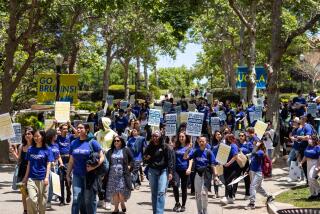Back to Public Service
- Share via
Beginning in the 1960s, mistrust of government turned young Americans away from public service. The Vietnam War undermined their faith that government knew what it was doing. Watergate said to them that there was an erosion of values at the top. Now there are signs on American campuses that they are turning back.
Two marks of a civil society are a shared understanding that people depend on one another, and a willingness to balance private wants with public needs. Today’s college generation, which is young enough to have escaped the cynicism of its elders and informed enough to know about the world’s problems, accepts that again.
Often, though, young people remain unaware of the opportunities for public service. So it is important to welcome on the scene the Project for Public and Community Service--endorsed by more than 100 colleges around the country, housed on the Brown University campus in Rhode Island and headed by the presidents of Brown, Georgetown and Stanford.
The project is an outgrowth of a report last year by Frank Newman, president of the Education Commission of the States. Newman said that “if there is a crisis in education in the United States today, it is less that test scores have declined than it is that we have failed to provide the education for citizenship which is still the most significant responsibility of the nation’s schools and colleges.”
The project, supported by several foundations, serves as a clearinghouse for information about public and community-service opportunities. It asks college presidents to provide leadership in encouraging that service. And it looks at government policies that could help students undertake such service--for example, through work-study programs that would pay students for what is generally considered voluntary work.
In the thought-provoking book, “Habits of the Heart,” published last year by the University of California Press, a team of professors warned that “one of the keys to the survival of free institutions is the relationship between private and public life, the way in which citizens do, or do not, participate in the public life.” Individualism, long a linchpin of American character, can stand in the way of that participation. Now thousands of students, with the encouragement of their universities, may be reaching beyond individualism to commitment. It is a heartening sign.
More to Read
Sign up for Essential California
The most important California stories and recommendations in your inbox every morning.
You may occasionally receive promotional content from the Los Angeles Times.













